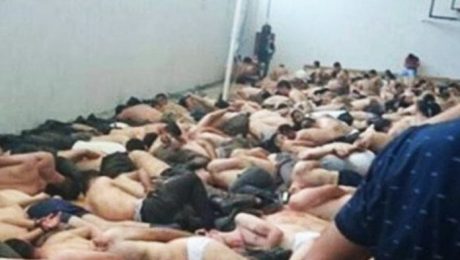Keyword: Persecution of Hizmet by Erdogan

This is beyond a witch-hunt – Turkey now blames Gülen movement for 9/11 attacks
In yet another example of scapegoating the Gülen movement for anything bad in Turkey or in anywhere else in the world, President Recep Tayyip Erdoğan’s chief advisor Yiğit Bulut hinted at connections between FETÖ and the 9/11 terrorist attacks in the US.

As Turkey’s war on Gulen escalates, so does impact on Africa
While critics say that Gülen is at best a cult figure, he is considered by many the legitimate spiritual leader of an Islamic movement that is focused on humanitarian service – hence the common name Hizmet – as well as interfaith dialogue and education.

Turkish high-schooler commits suicide after father was dismissed under emergency rules
B.N.M., a freshman high school student killed herself allegedly after being bullied by classmates and lecturers over her teacher father’s dismissal from the profession due to his ties to the Gülen movement, on Oct. 24.

Interview: U.S. Judge Says Turkey’s Judiciary ‘Taken Over’ By Erdogan
Even before the coup attempt in July, the judiciary was being essentially taken over by [then] PM Tayyip Erdogan. When the attempted coup occurred in July, within 24 hours there were arrest warrants for almost 3,000 judges. And it’s very clear, and in fact it’s been admitted by the deputy chair of the High Council [of Judges and Prosecutors, the body that selects and assigns judges], that that list of judges had existed for years.

Return to Turkey or lose citizenship, gov’t tells Gülen followers
The Justice and Development Party (AKP) will revoke the citizenship of followers of the faith-based Gülen movement who sought refuge abroad due to a government crackdown on alleged movement sympathizers if they do not return to Turkey within a certain period of time, the pro-government Sabah daily reported on Thursday.

Erdogan Purge Against Gulenists Could Prove Lucrative
The power struggle between the Turkish state and the Fethullah Gulen-led Hizmet Movement continues to reverberate in Turkey. The number detained, arrested, jailed, and dismissed from their jobs since the July 15 coup attempt has reached well over 100,000, 40,000 of whom have been detained on suspicion of having links with Hizmet. One third of the highest-ranking armed forces officers have been dismissed. Almost every major institution—military, judiciary, media, education, business—has been affected.

Detainees ‘beaten, sexually abused and threatened with rape’ after Turkey coup, Human Rights Watch claims
In a 43-page report published on Tuesday, the human rights group said a “climate of fear” had prevailed since July’s failed coup against President Tayyip Recep Erdogan and the arrest of thousands under a state of emergency.

Turkey’s Erdogan and unending human rights repression
The judiciary, media organisations, opposition parties, civil servants, charity groups, just to mention a few, are being subjected to a daily dose of massive abuses and suffocation in Turkey under President Recep Tayyip Erdogan. The recent catch to the abuse list is the sacking of medical professionals, scientists, and other academics from universities.

‘Turkey has become dangerous for us’: Failed coup has some seeking asylum here
They seemed an utterly normal family and yet were scared to publicly reveal their names. They came from Turkey, where a coup attempt in July led to a government sweep of mass arrests and firings. Targeted with particular suspicion: anyone affiliated with a popular movement known for its schools, good works, pro-Western brand of Islam and perceived elusiveness.

Over 30 Turkish diplomats, families seek asylum in Germany
Nearly three dozen Turkish diplomats and family members have claimed asylum in Germany over alleged affiliation to the network of US-based opposition leader Fethullah Gulen, whom the government in Ankara claims to have masterminded the failed July 15 coup attempt.

Turks fleeing post-coup reprisals find shelter in Pittsburgh
Until this summer, Cetin Gul of Istanbul, Turkey, worked as a videographer for a company that did promotional work for clients that included a charity organization. That charity, Hizmet, is associated with the movement of Fethullah Gulen. After a deadly and unsuccessful coup attempt by some in the Turkish military in July, the government began suppressing organizations associated with him. “Because of the direct association with Hizmet, I was a direct target,” Mr. Gul said.

Turkey detains Mozambican software developer over links to Gülen movement
Helton Silva Malambane, a software developer from Mozambique who previously worked with the now-shut-down Fatih University, was detained by police at his residence in İstanbul over links to the Gülen movement, whose sympathizers the government accuses of masterminding a failed coup attempt on July 15. Twenty-seven-year-old Malambane was detained after police received anonymous tips about him.




















